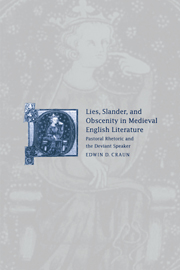Crossref Citations
This Book has been
cited by the following publications. This list is generated based on data provided by Crossref.
Burrow, J. A.
2002.
Gestures and Looks in Medieval Narrative.
Cavanagh, Dermot
2003.
Language and Politics in the Sixteenth-Century History Play.
p.
1.
2008.
Literature and Heresy in the Age of Chaucer.
p.
299.
Davenport, W. A.
2010.
Dreams in Gower'sConfessio Amantis.
English Studies,
Vol. 91,
Issue. 4,
p.
374.
Ladd, Roger A.
2010.
Antimercantilism in Late Medieval English Literature.
p.
23.
Bodden, M. C.
2011.
Language as the Site of Revolt in Medieval and Early Modern England.
p.
7.
Harris, Carissa
2011.
Talking Turpiloquium: Gendering the Problem of “Spekyng Rybawdy” in Mirk’s Festial and Idley’s Instructions.
Neophilologus,
Vol. 95,
Issue. 3,
p.
491.
2016.
English Alliterative Verse.
p.
237.
Soukalová, Kateřina
2016.
Historický vývoj konceptů fámy a „veřejného mínění“.
HISTORICKÁ SOCIOLOGIE,
Vol. 2015,
Issue. 1,
p.
95.
2017.
The Evolution of Verse Structure in Old and Middle English Poetry.
p.
320.
2017.
Shaping the Archive in Late Medieval England.
p.
215.
Batkie, Stephanie L.
2018.
Of Poets and Prologues.
The Yearbook of Langland Studies,
Vol. 32,
Issue. ,
p.
245.
Strub, Spencer
2018.
Learning from Shame.
The Yearbook of Langland Studies,
Vol. 32,
Issue. ,
p.
37.
Magnani, Roberta
and
Watt, Diane
2018.
On the edge: Chaucer and Gower’s queer glosses.
postmedieval,
Vol. 9,
Issue. 3,
p.
269.
Kurzon, Dennis
and
Kryk-Kastovsky, Barbara
2018.
Legal Pragmatics.
Vol. 288,
Issue. ,
p.
1.
Pascua, Esther
2019.
Invisible enemies: the devastating effect of gossip in Castile at the end of the fifteenth century.
Journal of Medieval Iberian Studies,
Vol. 11,
Issue. 2,
p.
250.
LEDO, JORGE
2019.
THE RECOVERY OF FREEDOM OF SPEECH IN THE CULTURE OF HUMANISTS AND THE COMMUNICATIVE ORIGINS OF THE REFORMATION.
Traditio,
Vol. 74,
Issue. ,
p.
375.
Craun, Edwin D.
2019.
A Taciturn Will.
The Yearbook of Langland Studies,
Vol. 33,
Issue. ,
p.
43.
2020.
The ‘Roman de la Rose' and Thirteenth-Century Thought.
p.
323.
Whitehead, Christiania
2020.
The Afterlife of St Cuthbert.



